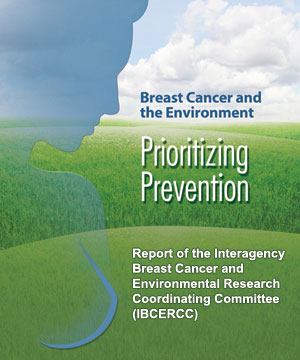 On Tuesday, February 12, 2013 the federally mandated Interagency Breast Cancer and Environmental Research Coordinating Committee (IBCERCC), released its report, Breast Cancer and the Environment: Prioritizing Prevention.
On Tuesday, February 12, 2013 the federally mandated Interagency Breast Cancer and Environmental Research Coordinating Committee (IBCERCC), released its report, Breast Cancer and the Environment: Prioritizing Prevention.
This report is a call to action to develop a national strategy to increase research in breast cancer prevention with a focus on how environmental factors affect the development of the breast across a woman's lifespan and her risk of breast cancer. The report offers seven recommendations to highlight the urgent need for coordinated, targeted efforts to identify and mitigate the environmental causes of breast cancer.
Zero Breast Cancer is a proud member of IBCERCC and is pleased that many of the recommendations from the committee reflect our organization's 17 year mission to find the environmental causes of breast cancer through community participation in the research process. We will use the recommendations from this report to guide us as we continue to carry out our mission. Like you, we look forward to the day when we have an early preventative strategy for breast cancer.
Read the full report at: http://www.niehs.nih.gov/about/boards/ibcercc/
The report is also generating some media attention:
Forbes
New Government Breast Cancer Report Calls for Focus on Prevention, Study of Environmental Risk Factors
A report out this morning by the Interagency Breast Cancer and Environmental Research Coordinating Committee (IBCERCC) highlights the need for increased funding and research of the various chemical and physical factors that may contribute to breast cancer, as well as the potential for cancer prevention, not just diagnosis and treatment to decrease both the incidence of cancer and healthcare costs. This is the third federal cancer panel report to highlight the unrealized potential for cancer prevention.
San Francisco Chronicle
Emphasizing breast cancer prevention
Until now, federal research on breast cancer has been largely limited to developing treatments and finding a cure. A new congressionally sanctioned study suggested that the federal government may by missing the most promising path of all: a focus on prevention. The report was the result of a 2008 law that created a committee to examine the state of breast cancer and environmental research and to recommend ways to eliminate any knowledge gap.
http://www.sfgate.com/opinion/editorials/article/Emphasizing-breast-cancer-prevention-4270381.php
Center for Public Integrity
U.S. report urges deeper look into breast cancer's environmental links
A new federal advisory panel report makes a forceful case for more research into environmental causes of breast cancer, which was diagnosed in 227,000 women, killed 40,000 and cost more than $17 billion to treat in the United States last year. Compiled by the congressionally mandated Interagency Breast Cancer and Environmental Research Coordinating Committee, the report notes that most cases of breast cancer "occur in people with no family history," suggesting that "environmental factors - broadly defined - must play a major role in the etiology of the disease." Yet only a fraction of federal research funding has gone toward examining links between breast cancer and ubiquitous chemicals such as the plastic hardening agent bisphenol A; the herbicide atrazine; and dioxin, a byproduct of plastics manufacturing and burning, says the report, prepared for Health and Human Services Secretary Kathleen Sebelius and released today.
New York Times
Report Faults Priorities in Studying Breast Cancer
The report, "Breast Cancer and the Environment - Prioritizing Prevention," published on Tuesday, focuses on environmental factors, which it defines broadly to include behaviors, like alcohol intake and exercise; exposures to chemicals like pesticides, industrial pollutants, consumer products and drugs; radiation; and social and socioeconomic factors.



